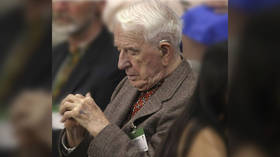Ukrainian Nazi veteran honored by Canada put on Russia's wanted database

The Russian Interior Ministry has placed Yaroslav Hunka, an elderly Canadian-Ukrainian Nazi veteran, on its official database of wanted individuals, multiple media outlets reported on Tuesday.
Hunka’s appearance at the Canadian House of Commons last month triggered a major scandal, when he was given a standing ovation by lawmakers, as well as Prime Minister Justin Trudeau and visiting Ukrainian President Vladimir Zelensky.
Then-speaker Anthony Rota described the 98-year-old as a “Canadian hero” who’d “fought the Russians” during World War II. Hunka volunteered to join the 14th Waffen SS Grenadier Division.
The Russian database does not provide details of the crime for which Hunka is wanted, merely stating his date and place of birth: April 13,1925 and the village of “Ulman, Poland,” according to reports. The settlement is actually named Urman and is located in Ukraine’s Ternopil Region, which was part of the Second Polish Republic at the time of Hunka’s birth.
Last week, Russia’s Investigative Committee charged Hunka in absentia with genocide, claiming that archive documents serve as evidence that he and fellow SS Galicia members killed at least 500 civilians between February 23 and February 28, 1944.
The alleged atrocities took place in Guta Penyatskaya, a village in what is now Ukraine’s Lviv Region. The Ukrainian nationalists killed their victims, including Poles and Jews, with the goal of ethnically cleansing the area, which was in line with Nazi ideology, the Investigative Committee said.
Some Polish officials had previously called on the government to seek Hunka’s extradition for trial.
Ottawa apologized for lionizing Hunka after his past allegiance was highlighted by Jewish organizations. Rota stepped down from his position, accepting full responsibility for the scandal.













